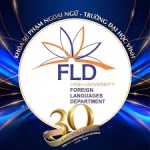Speakers
Description
The integration of cultural elements in language instruction has been advocated as a way to increase learner motivation, engagement and cross-cultural understanding. Culturally Responsive Education (CRT) has risen from the more traditional pedagogy frameworks in that it stresses how to integrate students' cultural background into their learning. The purpose of the study was to examine Culturally Responsive Teaching (CRT) and its effect on B1- level English learners’ speaking skills in a Distance Learning Program implemented by a university in the North of Vietnam. Using questionnaires and classroom observations, the small scale research investigated 25 student perceptions of CRT as well as the effectiveness of CRT enactment as a classroom innovation. The outcomes indicate that CRT had a positive effect on the students' levels of engagement, confidence and intercultural competence. More specifically, participants reported higher levels of motivation and risk-taking behavior as well as more effective intercultural communication skills. Secondary to this was the increase in general vocabulary range, grammatical accuracy and fluency benefits obtained. Yet problems emerged with respect to materials, adapting the model and teacher training. Future work should center on creating culturally responsive materials and providing continuous professional development for CRT to be effectively executed.

